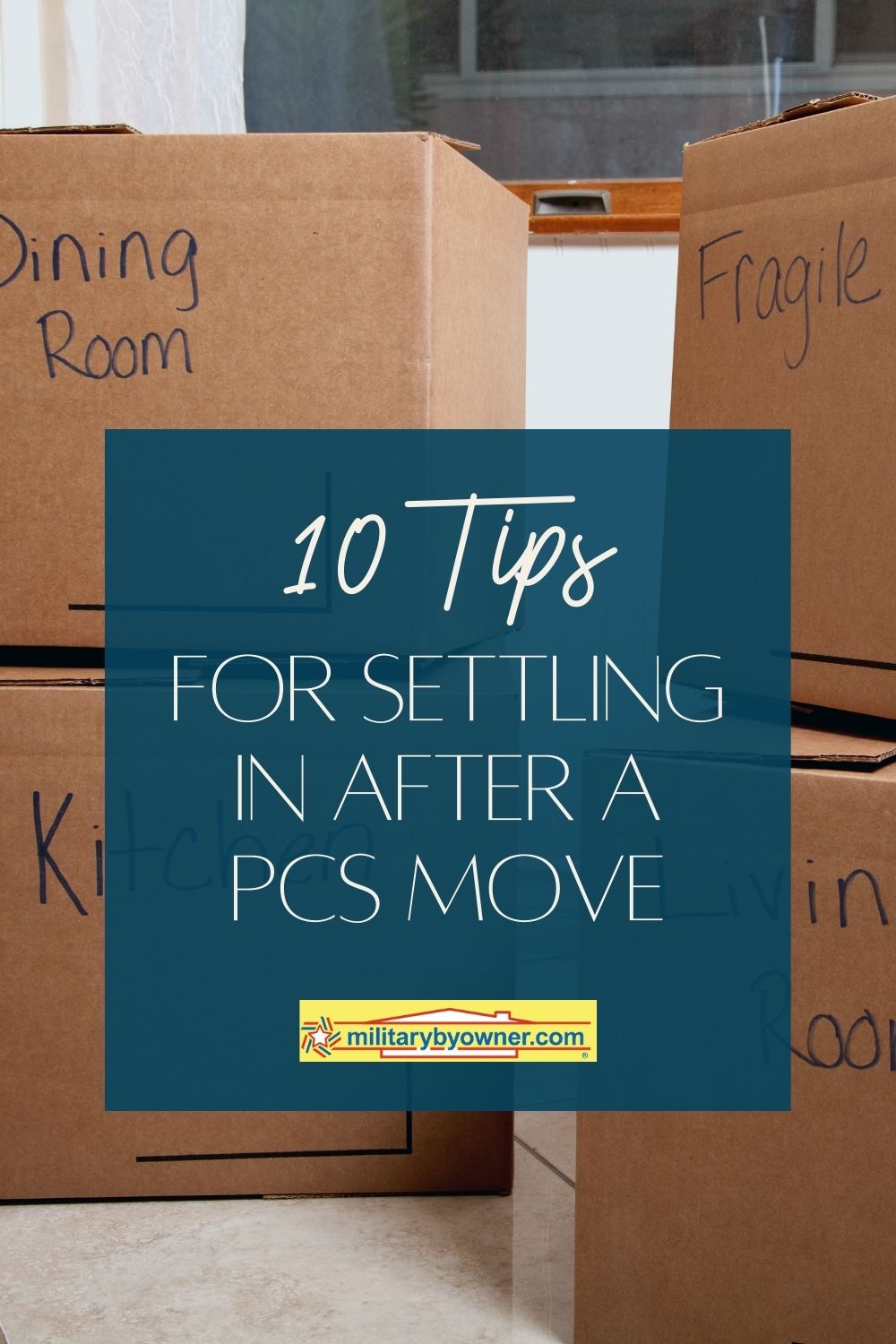
Photo from Canva
In this article:
The first thing military families do at the hint of a pending PCS move, is to fire up the Google machine and MilitaryByOwner to research potential duty stations and look for housing.
Preplanning is about taking care of as much business as possible before you leave so you can spend less time wading through practicalities and more time settling into your new hometown. Creating a new home life takes time, but there are ways to speed up the process and maximize your time.
1) Use Your Social Network Before You Leave
It’s easier than ever to find connections at your new duty station. Pop in a search on your favorite social platform, especially local Facebook groups or even LinkedIn military groups, and you’re bound to make an initial connection with minimal effort. Don’t be afraid to ask for recommendations, advice, and opinions. New milspouse friends are quick to share their best tips. Advice is the tie that binds military families together.
If you don't know anyone in your new town, reaching out to friends of friends is the simplest way to get the process going. Military families have an instinct for taking care of their own, and a PCS will cast a wide net for friends offering support.
Knowing someone at your new duty stations takes away some uneasiness. The comfort of a familiar face will also give you something to look forward to, making the transition a little easier.
Read 10 Military Spouse Blogs We Think You'll Love. All of these bloggers have real-world tips for settling in fast.
2) Settling Into the House
Each family has move-in priorities when they arrive, whether connecting the Wi-Fi, unpacking the kitchen, or creating a calm, quiet baby nursery. So tackle your preferences first—they’ll make the house feel like home faster.
It’s an ambitious goal, but aim to unpack all of your boxes the first week. No, everything doesn’t have to have a perfect forever home, but getting rid of the mountain of cardboard boxes leaves more space and lets your family settle in sooner.
And finally, go ahead and hang those military awards, family photos, and decorative art items on the wall. Familiarity brings comfort after a PCS move, so even though you might not feel like measuring the perfect height for the memento gallery you’ve curated over the years, it's important to add that personal touch to your home.

Photo from Canva
3) Meet the Neighbors
Most of the time, your new neighbors will hang back and let you unpack and organize in peace for a few weeks before stopping by and introducing themselves. But if you’re ready to meet the neighbors, conduct sidewalk chats, and start a street text string, you’ll have to make the first move.
Building relationships can be as easy as leaving a note card with your family’s information you’d like to share, like names, ages, pets, and phone numbers. Neighbors can make a duty station extra special, so put your best foot forward and say hello!
4) Sightsee in Your New Hometown
Everyone needs a few hours’ break from unpacking. Checking out your new hometown’s unique shopping, dining, and cultural scene is the perfect excuse to take a break and build community connections. Ask your neighbors for recommendations for the best ice cream shop, local restaurant, or a must-see museum or park.
5) Build Connections at Your Children's School
Families with children have an instant cache of potential new friends. The chances to meet other families are endless. After registering, the school usually spreads your contact information to PTA groups, military family committees, and welcome clubs. The opportunity to jump in and participate in playgroups or back-to-school nights will quickly produce a few new phone numbers to text later. You probably will need a new local emergency number for the kids’ school registration, right?
As the school year progresses, volunteer opportunities open and lead to future friendships. Volunteering in your child’s classroom can be particularly helpful as you’ll learn about their classmates and parents, which helps foster play dates and other get-togethers.
6) Make Connections in Your Community
If the school angle isn’t for you, there are many more ways to get out and meet people after a military move, so seek out the activities that make you happy. Find a gym or look for a running or walking group or a child-friendly stroller class.
Blue Star Families, a military family support organization, launched Blue Star Neighborhoods to connect families where they live. Check out their meet ups!
Many local churches offer yoga or other exercise classes for nominal fees or without charge. While practicing your down dogs, look into which types of groups the church provides. You’ll usually find a choir, Bible study, and women’s and men’s groups. Plus, many local clubs, like crafting or writing groups, often rent church space for their meetings.
Your kids need connections, too, so continue the activities they were involved with before leaving or give them a chance to try new options. A new neighborhood might encourage a new passion for a different sport or club.

Photo from Canva
7) Dive into Military Life on Base
Military installations host plenty of activities for kids and adults. You can find everything from baseball and soccer leagues to a newcomers’ brief and tour. Find your base’s homepage to direct you to everything you need to know about a recent arrival. For example, the Youth Sponsorship Program aligns new families with current families to navigate the transition, especially for the school-aged children.
Have you thought about living in military housing? What to Consider When Living on Base gives you the details you need to know.
8) Check out Your Local Library and Parks and Recreation Services
They offer affordable classes, reading groups, and activities for families. Simply wearing a smile and chatting at public playgrounds or during an exercise class often starts a fun conversation and an invitation to join upcoming events.
9) Step Back Into Work Life
Try networking before applying to hundreds of jobs and getting discouraged. Networking pulls double duty if you’re getting back into work life. It can help you find your dream job and could introduce you to people in your industry locally.
If you prefer to work as soon as possible after a military move, there’s a good chance you’ll build relationships in no time, complete with water cooler chats if you’re in person or Zoom Happy Hours on Friday afternoons.

Photo from Canva
10) Volunteer Your Time and Talent
Giving to others is a no-fail way to meet new people who already have something significant in common with you. This common cause puts like-minded people together to make great things happen in your neighborhood and community. If you’re passionate about helping animals, the environment, the elderly, or the homeless population, the list of volunteer-run groups is endless.
If you need somewhere to start, try VolunteerMatch. It’s a simple way to match your zip code with causes you care about. There are more than 90,000 non-profit organizations to choose from worldwide. They even assemble virtual volunteer options to perform at home and offer webinars such as Social Media and Volunteer Engagement.
It’s tough to move to a new neighborhood and settle in as you did at your last duty station, but the unsettled feeling won’t last long. After making the house livable and comfy, start connecting to the community. Don’t waste the chance to explore new opportunities and meet amazing people because, before you know it, you’ll have PCS orders in hand again
By Dawn M. Smith


back to top